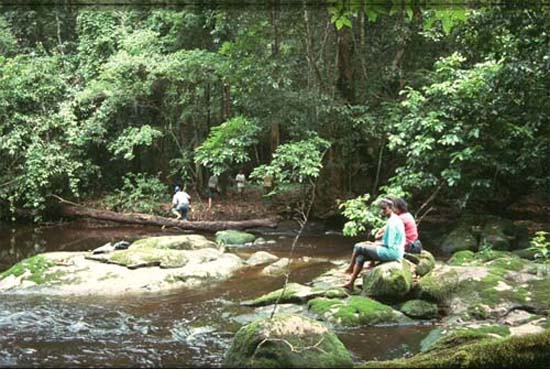
Jeanine Ertl served as a Peace Corps Community Development Worker and non-formal educator in a village called Marchall Kreek in Suriname, South America
Peace Corps Experience: Jeanine Ertl
by Chrysann Thau
Imagine beads of water running down the ridge of your back, along the curve of your upper lip, and down the arch of your leg behind the knee simply from sitting in a room lit by two candles. That is the humidity in Suriname. Think about not having running water and having to carry three buckets full from the creek to your home. These are the conditions in Suriname. And this is the story of Jeanine Ertl.
Jeanine Ertl served as a Peace Corps Community Development Worker and non-formal educator in a village called Marchall Kreek in Suriname, South America. After graduating from UC Berkeley, she wanted to live in another country for an extended period of time, learn another language, and share unique and amazing experiences with others on a personal level. With a desire to explore creative avenues and future potentials, she joined the Peace Corps, a program where she could offer assistance to a wide range of people on a micro level.
While she was at Cal she volunteered with Berkeley Reads as a tutor, worked at the National Writing Project, and took additional classes in photography. She felt the theories and analyses that she learned in her classes became practical tools that she used daily as she faced real life case studies. Sometimes the job itself entails more than one expects and Ertl felt that everything she had learned prior to Peace Corps has helped her during her term.
During her term in Suriname, Ertl worked on a variety of initiatives, involving activities such as organizing and teaching English classes to youth and adults, sharing organic gardening techniques with neighbors and local farmers, and co-teaching local trainings on agricultural methods and women's health. When Ertl first moved into the village, many adults and children would ask her to teach them English. After her decision to teach the English classes, she sat down to write lesson plans from scratch for the next two years. Ertl thought back to her foreign language classes and looked through English tutorial manuals to decide if she should first teach the alphabet or basic pronunciation. The classes took place twice a week in a local community center. During the months that she was there, the number of students increased from 15 to 52. One of her most memorable classes was when she hauled her kitchen down to the community center to practice vocabulary with real life objects. The class passed around pots, pans, plates, cups, and utensils and would say the item's names aloud while teaching Ertl the words for these same objects in their native language.
After a couple of months, Ertl developed a routine where she would get ready for her English lessons on Monday and Wednesday afternoons, help at the school garden on Wednesday mornings, and go to the Women's Group meetings in the village on Sunday afternoons. The Women's Group was another one of her projects where she wanted to play an active role in developing an organization into a stronger one. The Women's group provided a place where women in the village got together to talk about a myriad of issues. The group was composed of women form age 25 to 65 and their discussions primarily focused around the poverty that they have to raise their families in. At the time of Ertl's arrival, the women's group still lacked cohesion and the passion to work on solutions to their concerns. She helped them build teamwork between the women and focused on finding solutions for their problems by addressing them one at a time. One of the main projects was the Mosquito bed-net project where Ertl helped the women write a project proposal and meet with potential funders. Over 100 mosquito bed nets were sold the following year at reduced costs to those living in Marchall Kreek, which helped reduce the number of malaria cases in their region. The Women's group also helped educate the women in the area about the importance of papsmears and with the help of a national family-planning NGO, the total number of women screened increased by 95%. By the end of the year, the women were also able to farm peanuts to sell in the capital for extra money, and other activities that they originally thought were almost impossible to accomplish.
Ertl is still amazed when she thinks of the many people she met and worked with over a span of two years. But her greatest reward is to know that she will always have a family in Suriname.
Jeanine Ertl completed her term of Peace Corps service in August of 2002. She plans to apply to national graduate programs after one more year of travel.
For those interested in joining Peace Corps, Ertl's experience was specific to the married couple program and to the location of Suriname. Depending on the program and location where you serve, the experience will be individualized and may be very different.
